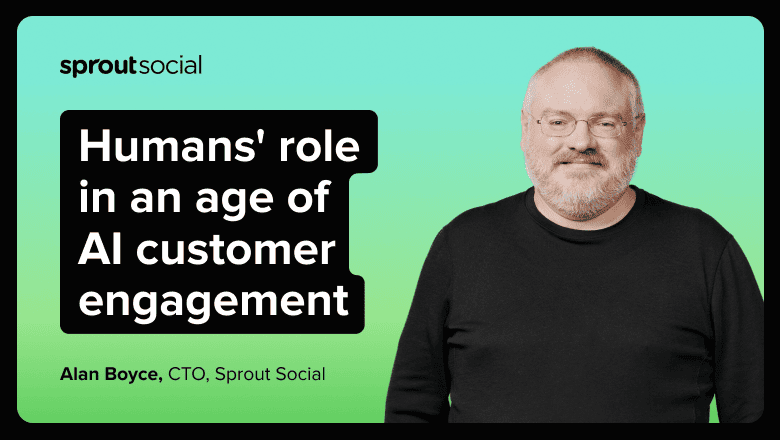Humans’ role in an age of AI customer engagement
The latest Sprout Social Index™ shows that 73% of consumers will take their business elsewhere if a brand doesn’t respond on social. That stat Read more... The post Humans’ role in an age of AI customer engagement appeared first on Sprout Social.

The latest Sprout Social Index™ shows that 73% of consumers will take their business elsewhere if a brand doesn’t respond on social. That stat isn’t surprising, but it is an important reminder. Expectations are rising, and so is the demand on social and care teams to respond quickly, personally and at scale.
But that pressure brings an equal dose of opportunity. One of the most exciting parts about leading Sprout’s engineering org is being part of the team building for what’s next. Social is never static, and neither are the needs of the brands we serve. Our job is to help teams not only keep up, but get ahead by building solutions that maximize social while removing unnecessary complexity.
That’s where AI comes in. It allows brands to keep pace with changing consumer behavior while removing friction from their workflows.
Still, as we bring more AI into the picture, a critical question remains. What’s the role of humans in all of this? Let’s talk about why your team is still your most powerful resource, and how people will remain at the heart of your AI-powered customer engagement strategy.
Understanding AI customer engagement
AI customer engagement is the use of artificial intelligence to better support, respond to and understand customers across digital touchpoints. It’s the key to helping teams deliver more timely, meaningful experiences at scale.
In the context of social media management, that includes capabilities like:
- Automated responses, such as chatbots or comment moderation.
- AI-powered routing to direct inquiries to the right team or agent.
- Predictive analytics to anticipate customer needs and behaviors.
- Sentiment analysis to gauge how customers feel about a brand or topic.
- Response enhancements that adapt messaging to better fit individual needs.
But what’s ahead is even more exciting. AI agents—autonomous or semiautonomous software that can take action, understand nuance and deliver real outcomes—are reshaping how brands serve their audiences. These aren’t bots. AI agents use machine learning and natural language processing (NLP) to understand the context and intent behind customer interactions, and respond in a more human way.
This shift will change what’s possible in social care. These agents will redefine how brands deliver customer experiences, making it possible to completely resolve hundreds or thousands of routine inquiries in seconds. This innovation will enable teams to analyze social data and anticipate customer needs (or potential issues) before they even surface.
This marks a monumental move from reactive customer support to proactive, ROI-focused capabilities. And the best part? Consumers are ready for it: 73% support brands using AI to deliver faster service on social, according to our Q1 2024 Sprout Pulse Survey.
But it’s important to say this clearly: The goal isn’t to replace people. It’s to free up their bandwidth for more important strategic work.
AI customer engagement frees up your team to be more productive
Most marketing and care teams are already using AI in some form, and it’s quickly become a powerful ally in the fight against burnout. Far from shrinking teams, AI is helping them grow. According to the Index, 54% of marketing leaders believe AI will enable them to expand their teams, while 30% expect it to evolve roles and responsibilities.

That reshaping is already underway. As AI takes over repetitive, time-intensive work, the need for constant human-in-the-loop oversight will lessen. In its place, new roles will emerge: AI operations managers, governance leads, strategy owners.
Think of your team as mentors to a group of smart, fast-learning interns. Right now, you’re guiding their work. But as they get more capable, your focus will shift from oversight to orchestration: configuring, tuning and scaling systems that support meaningful customer experiences.
With AI agents taking on repetitive, time-consuming tasks, that frees up your team to do the work only humans can do: proactively connecting with customers, navigating nuance, solving complex problems and creating brand-building moments. This doesn’t just strengthen loyalty. It opens the door to new customer acquisition and deeper, more human connections.
How to prepare your teams for the future of AI customer engagement
We’re at the beginning of a new wave in customer engagement. Preparing now will give your team the clarity and confidence to lead your industry and stand out from competitors.

1. Audit how AI is used today
Understand where AI is already embedded in your service and engagement workflows. What’s working well? Where are the friction points? Are you introducing roadblocks to your customer experience? Consumers say their biggest fear of brands using AI for customer service is that it will make it more difficult to reach a person, according to Gartner.
An audit will reveal where you’re already gaining value, where there’s room to do more and the best way to keep humans involved.
2. Find opportunities to experiment
Where can AI be embedded into your existing workflows to drive greater efficiency, personalization or responsiveness? Look for simple, high-impact use cases to test. For example, implement AI-powered message translation and spam detection. Start small, learn fast and iterate. These strategic tests can unlock big insights, and pave the way for wider implementation.
It can be tempting to try and move too fast, but that puts you at risk of creating silos, running afoul of legal and ethical challenges, complicating your tech stack and failing to reach business goals. That’s why, at Sprout, our philosophy is to thoughtfully evolve our AI innovation to help you prepare for the future—not treat it like a shiny new object.
3. Evaluate your tech stack
Are your tools integrated? Is your data flowing freely between systems so AI can access the insights it needs to take meaningful action? If not, it’s time to rethink your setup. Laying the right foundation now ensures your team can fully harness AI’s potential to deliver faster, smarter and more impactful customer experiences.
At Sprout, we’re focused on delivering key enhancements—specifically within automated workflows, compliance and governance, and reporting flexibility—that will immediately enable teams to work smarter, faster and more efficiently in providing support. This crucial step lays the groundwork for more powerful AI customer engagement in the future.
4. Train your team
Ease your team into new ways of working, and support them as they harness new skills. Provide comprehensive training for AI tool proficiency, customer journey mapping, and customer data privacy and security. Be sure to emphasize the importance of developing the soft skills AI can’t replicate: critical thinking, adaptability, collaboration and emotional intelligence.
Build a customer engagement strategy with humans at the heart
AI is changing how we engage with customers. But it’s not changing the fact that people want to feel heard, understood and valued. By handling the routine requests, AI gives your team more time to create those human moments that drive connection and loyalty.
As your tools get more powerful, your team’s role will evolve, but it won’t disappear. When AI and human expertise are working in sync, you get the best of both worlds: faster service, deeper insights and experiences that feel more personal.
The teams that thrive will be those that see AI not as a replacement, but as a partner. One that helps them work faster and smarter, while staying deeply connected to the people they serve. It’s the combination of technology and human care that will set your brand apart.
Learn more about how Social Customer Care by Sprout Social’s latest innovations can help you lead the new wave of social-first customer care.
The post Humans’ role in an age of AI customer engagement appeared first on Sprout Social.


























![Brand and SEO Sitting on a Tree: K-I-S-S-I-N-G [Mozcon 2025 Speaker Series]](https://moz.com/images/blog/banners/Mozcon2025_SpeakerBlogHeader_1180x400_LidiaInfante_London.png?auto=compress,format&fit=crop&dm=1749465874&s=56275e60eb1f4363767c42d318c4ef4a#)

![How To Launch, Grow, and Scale a Community That Supports Your Brand [MozCon 2025 Speaker Series]](https://moz.com/images/blog/banners/Mozcon2025_SpeakerBlogHeader_1180x400_Areej-abuali_London.png?auto=compress,format&fit=crop&dm=1747732165&s=beb7825c980a8c74f9a756ec91c8d68b#)
![Clicks Don’t Pay the Bills: Use This Audit Framework To Prove Content Revenue [Mozcon 2025 Speaker Series]](https://moz.com/images/blog/banners/Mozcon2025_SpeakerBlogHeader_1180x400_Hellen_London.png?auto=compress,format&fit=crop&dm=1747758249&s=9f3c5b1b7421f862beace1cb513053bb#)






















![The 11 Best Landing Page Builder Software Tools [2025]](https://www.growthmarketingpro.com/wp-content/uploads/2024/04/best-landing-page-software-hero-image-1024x618.png?#)





































![How To Build AI Tools To Automate Your SEO Workflows [MozCon 2025 Speaker Series]](https://moz.com/images/blog/banners/Mozcon2025_SpeakerBlogHeader_1180x400_Andrew_London-1.png?auto=compress,format&fit=crop&dm=1749642474&s=7897686f91f4e22a1f5191ea07414026#)













![Marketers Using AI Publish 42% More Content [+ New Research Report]](https://ahrefs.com/blog/wp-content/uploads/2025/06/marketers-using-ai-publish-42-more-by-ryan-law-data-studies-1.jpg)

![Brand pitch guide for creators [deck and email templates]](https://blog.hootsuite.com/wp-content/uploads/2022/06/brand-pitch-template.png)












![Social media image sizes for all networks [June 2025]](https://blog.hootsuite.com/wp-content/uploads/2023/01/Social-Media-Image-Sizes-2023.png)

![The HubSpot Blog’s AI Trends for Marketers Report [key findings from 1,000+ marketing pros]](https://www.hubspot.com/hubfs/state-of-AI-1-20240626-53394.webp)
![AI can boost conversions from your web page — HubSpot’s CMO shows you how [tutorial]](https://knowledge.hubspot.com/hubfs/ai-1-20250605-395473.webp)
![The state of inclusive marketing in 2025 [new data + expert insight]](https://www.hubspot.com/hubfs/inclusive-marketing-report.webp)












![X Highlights Back-to-School Marketing Opportunities [Infographic]](https://imgproxy.divecdn.com/dM1TxaOzbLu_kb9YjLpd7P_E_B_FkFsuKp2uSGPS5i8/g:ce/rs:fit:770:435/Z3M6Ly9kaXZlc2l0ZS1zdG9yYWdlL2RpdmVpbWFnZS94X2JhY2tfdG9fc2Nob29sMi5wbmc=.webp)




